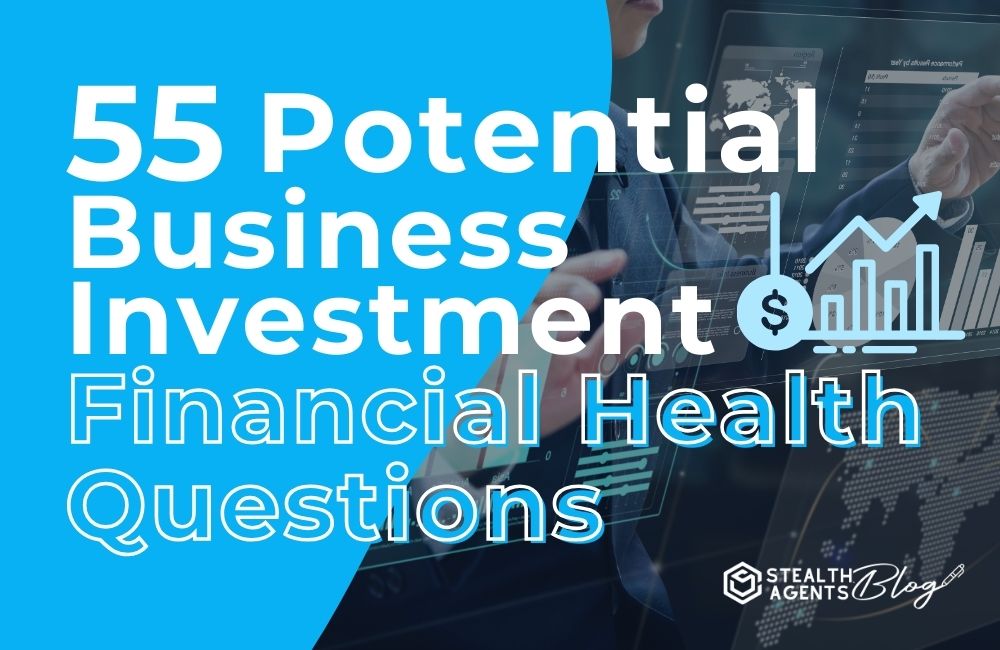The decision to invest in a business is akin to the excitement of a tightrope walker taking that first step onto the thin wire. It’s thrilling, but it’s also fraught with risk.
To ensure you’re not walking into a financial freefall, arm yourself with the right questions.
Here, we’ve compiled a comprehensive list of 55 financial health queries to dissect and evaluate potential business investments.
The Depth of Financial Inquiries
Before diving into the business waters, it’s crucial to understand what makes the currents flow. Here are 55 questions that can serve as your life jacket—helping you stay afloat in the often-choppy sea of investments.
-
What’s the current valuation of the business?
-
Do they have a positive cash flow?
-
Are the financial statements audited or reviewed by an external CPA?
-
What are their total liabilities?
-
What percentage of revenue goes towards debt payments?
-
Is the business generating any intellectual property that could be monetized?
-
What’s the historical performance like for the past five years?
-
Have there been any significant financial red flags or issues?
-
How much are they profitable after taxes?
-
What’s their dividend policy, and do they currently pay dividends?
-
How much of a buffer does the business enjoy in the current ratio?
-
What is their break-even point?
-
What are the sales and gross profit margins?
-
How much revenue and profit comes from their top three customers?
-
What are their inventory turnover rates?
-
What’s the age of their equipment and fixed assets, and what’s the depreciation schedule like?
-
How much do they spend on research and development?
-
What do the Payroll costs look like, and are they sustainable?
-
What are their sales growth or decline trends?
-
What are the accounts receivable turnover and collection periods?
-
Have there been any major lawsuits that might impact the financials in the future?
-
What’s the company’s price-earnings ratio?
-
Do they offer equity or ownership shares as part of their compensation?
-
What’s the return on equity or invested capital?
-
How are they funded?
-
What’s the cost of their capital?
-
What’s the return on the capital employed?
-
What is their competitive advantage, and how does it affect their financial position?
-
What’s their current position in the market, and how does it reflect on their finances?
-
What direct and indirect expenses are written off as tax deductions?
-
How much are they spending on marketing and what’s the ROI?
-
What are the tax implications and obligations that might come with the investment?
-
What’s the historical tax track record of the business?
-
Is their pricing strategy reflective of market demand and profitability?
-
Are there any assets that are underutilized or not generating income?
-
How are they impacted by seasonality, and is there a plan to manage that?
-
Is there a high customer churn rate, and are they able to address it?
-
Do they have a healthy pipeline of new products or services?
-
Are there any barriers to market entry or other regulatory advantages that protect their income?
-
What’s the company’s solvency position?
-
How strong is their working capital management?
-
What’s the return on total assets?
-
How much of their profit and cash flow is reinvested in the business?
-
How strong is their governance and internal control environment?
-
How transparent and clear is their accounting policy?
-
Are they carrying any goodwill on their balance sheet?
-
Are there contingent liabilities not fully disclosed in the financials?
-
What’s the reliability of the financial projections they’ve shown?
-
What’s their approach to income recognition, and is it conservative or aggressive?
-
How do they manage and minimize the impacts of currency fluctuations?
-
What are the bonding and insurance requirements, and how are they managed financially?
-
Have they suffered any product recalls or quality control issues that might have financial implications?
-
What’s the current and anticipated interest rate environment, and how does it affect their financing?
-
What impact does the business place on the environment, and are they facing increased costs or risks due to this?
-
How well do they manage and forecast macroeconomic risks, and what’s their track record in disruptions?
Conclusion
As you can see, assessing the financial health of a potential business investment isn’t a shallow endeavor. By delving into these detailed questions, you’re not just protecting your wallet—you’re ensuring the business you back has the legs to sprint through the marathon of market challenges.
Remember, making a prudent investment decision isn’t just about asking questions; it’s about understanding the story the numbers are telling, predicting the unplottable future, and aligning your financial destiny with a business that has all its cogs well-oiled. So, invest smartly, invest wisely, and may your ROI be as bountiful as your due diligence.











